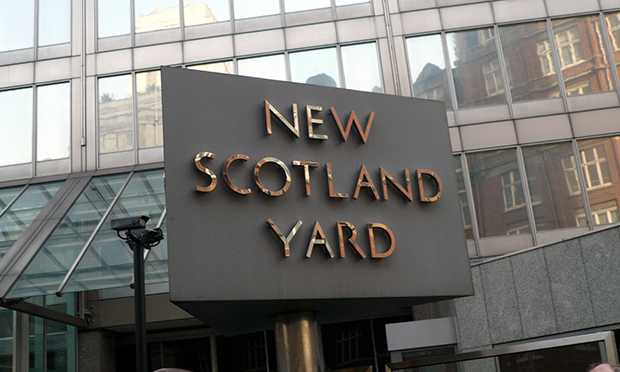Police accused of ‘racial profiling’ after stopping member of Hackney police scrutiny group

Photograph: Cory Doctorow / Flickr
The Metropolitan Police have been accused of “racial profiling” after two youth leaders from the independent police scrutiny group Hackney Account were stopped and searched last week.
Account has been vocal over a “deep disconnect in trust” in the force, releasing a report recently that showed handcuff usage in Hackney increased by 158 per cent in the last three years.
It also found that the borough’s young Black men are six times more likely than their white peers to be stopped and searched.
David Smith, who has acted as head of research for the group, was searched for weapons by Territorial Support Group (TSG) officers on the grounds that he had his hands in and around his pockets, and that when approached by police he said that he was coming “from his house” and getting something “for his house”.
The search, in which Smith challenges the officer on whether a Section 60 order is in place in the area, which would remove the need for reasonable grounds, took place alongside that of his friend, who was taken into a police van and searched, according to Account, on the grounds that he did not supply his name and address, and was seen with an electric scooter.
Young Hackney youth worker Smith said: “The police came across to me agitated with voices raised, so [me knowing the law] made a difference for my safety, because I tried to stay as calm as I can. But if I rightfully got agitated, which would have been for understandable reasons, it would have turned into a very different situation.
“I don’t know how two people, one walking a scooter and the other hands in pockets as it’s raining, head down a bit – how can that be suspicious?
“A lot of people are saying sorry that it’s happened to me, but I put myself in the position of being a neighbourhood activist, so I feel that I was the best person it could have happened to.
“Everyone should be happy it happened to me, because it shouldn’t have been someone else who did not know the law, who would get taken advantage of. It could have been someone with an easy temper who got hurt trying to fight for their rights and justice.
“I could have been the best person it could have happened to. All I want from this situation is to bring awareness to it.”
Both Smith and Account have now spoken out against the police on racial profiling as a result of the stop.
This is quite embarrassing @MPSHackney as i am a youth worker, also apart of @HackneyAccount and i am getting wrongfully stopped and searched. Imagined if the young people i work with see me getting treated like criminals how do u think the yp will see me after that. pic.twitter.com/fPc4kOnGzq
— 33cappa (@33cappa) March 3, 2021
Hackney Council for the Voluntary Sector CEO Jake Ferguson has also penned an open letter to borough commander Marcus Barnett questioning why Hackney’s Black communities are “continually being racially profiled in stop and search”.
Ferguson challenges the borough’s top officer on the increase in Section 60 orders in Hackney, adding: “As local Borough Commander you have a choice – you can ensure we are all treated fairly by your officers or you can continue to justify that stop and search is an effective tool at reducing crime because Black people are, in the minds of many Met officers I have engaged with, ‘more criminal’.”
According to the police, the Haggerston Street stop took place following increased patrols due to two stabbings in the area the previous day, with the TSG senior leadership calling on Smith to get in touch to speak with them about his experience.
The police stressed that a review by the Met’s Directorate of Professional Standards has identified no concerns around the officers’ conduct.
Asked whether he would take up the invitation, Smith said: “I don’t see the point, because in their contradictory message they have their mind made up that no code of conduct was broken, so what do I need to speak to them for? What would I get out of it? They have already made up their minds.
“A lot of people from my community have been telling me, ‘Don’t do it, don’t speak to them, it’s a waste of time’, but I saw hope in trying to change. I lost hope because I have experienced it first-hand in the mistreatment I have been through. I would have thought a public apology to say, ‘We’re sorry this happened’, but not even that.”
Speaking to the Citizen, author and Hackney Account community researcher Yolanda Lear said that her view of the TSG was “not protect and serve, more patrol and harass”, arguing that a more “militant” approach is taken by the group’s officers.
Lear said: “The [TSG] are viewed as wanting to be the army of the police, the army of the ends. They don’t have any sense of the community they’re working in, because they’re usually from other areas. They don’t know who is who, who is a possible suspect. If you’re from an area, you can tell, because you have grown up there and know certain behaviours.
“Imagine young people like David, who don’t know how to stay calm like David did, hearing the police officers spin his or her words like that, that is going to get you even more worked up, which could lead to the police officer saying that you’re trying to resist arrest, and the use of handcuffs is going to come out because you’re deemed a threat or becoming aggressive.
“People are going to see this young person is getting stopped by how many police officers? They are now becoming criminalised by the general public who are walking past and seeing that, even if they are not a criminal, so that taints the young person’s image in their own community just by that one stop and search, let alone the traumatic experience.”

The Met describes the several hundred officers who make up the TSG as the “highest trained public order officers… used at the forefront of spontaneous disorder and large scale public events”.
Questions were raised last year over the accountability of the TSG, after it was revealed that the division which includes it had fewer than one in 200 complaints upheld.
Account now says that its legal advice is that the grounds given to search Smith and his friend were “extremely weak and at worst illegal”, calling such grounds “the biggest red flag we have for racial profiling”.
The group is challenging the Met’s official response as showing a “lack of understanding, empathy and willingness to take accusations of racial profiling seriously”.
Account’s research has shown that Black people are four times more likely to have force used against them, and that searches carried out on young Black men have a much lower ‘hit rate’ than for white people.
Nearly 11,000 searches in Hackney carried out in the twelve months to October last year led to 2,392 positive outcomes, showing a ‘hit rate’ of roughly 22.1 per cent. This rate drops to 17.6 per cent among Black males aged 15-24, compared to a positive outcome rate of 21.9 per cent for young white men in the same category.
A spokesperson for Account said: “In case it needs repeating: living in Hackney, being Black, being young, wearing a tracksuit, does not make you a participant in knife crime or gang violence. Any judgement by police based on any one of these assumptions or stereotypes is not only incorrect but also illegal and in direct violation of the 2010 Equalities Act.
“Frequent rhetoric from police leaders, including our own Borough Commander, that racial disproportionality can be justified due to higher rates of criminality among black populations sets a precedent for this kind of discriminatory behaviour to take place.
“Again, it is worth repeating that discrimination based on statistical generalisations are illegal. Our concern after seeing this incident unfold is that these attitudes from senior leadership are playing their part in creating a culture of impunity where officers have a licence to search young Black boys simply based on their skin colour, their age and the borough they live in.
“It goes without saying that incidents like this – most of which are not picked up in the media – are deepening a crisis in trust and confidence in our community and traumatising our young people.”
Mayor of Hackney Philip Glanville and Cllr Susan Fajana-Thomas, Cabinet Member for Community Safety, said: “We’re deeply concerned about this incident, which further demonstrates the challenges and discrimination that young Black men can face when going about their everyday lives.
“We’re currently in conversations with those involved to better understand what happened and how we can prevent the disproportionate use of stop and search on Black residents – a critical issue which was further highlighted in Account’s recent report into policing in Hackney.
“Council and police officers met with Account following the report’s release to discuss how we can collectively implement the recommendations it makes in Hackney. This will include workshop sessions with Police to explore anti-racist practice and develop a shared understanding of the challenges raised in the Account report once we can safely meet face-to-face.
“This builds on the work we are taking forward as a Council and with partners on inclusive leadership and our commitment to being an anti-racist organisation.
“In the meantime, we’re working with MOPAC and the Police to ensure that accountability bodies, such as Hackney’s Safer Neighbourhoods Board and Stop and Search Monitoring group, are more representative of Hackney’s diverse communities, which will help ensure that institutions are being effectively scrutinised and held to account.
“We’re committed to listening to and working with local residents to ensure that their lived experiences are at the core of anti-racism strategies, and to rebuild faith and trust in the police in all of our communities.”
A Metropolitan Police spokesperson said: “Police are aware of a video showing part of the incident circulating on social media in relation to a stop and search carried out in Hackney.
“Officers stopped two men at around 16:30hrs on Wednesday 3 March in Haggerston Street following increased patrols due to two stabbings in the area the previous day.
“Both men were informed they were being detained for the purposes of a search.
“Nothing was found and the men then continued on their way.
“The officers involved in the stop were from the Met’s Territorial Support Group (TSG).
“The TSG senior leadership team would like the opportunity to talk to the man about his experience. The Met is taking steps to contact the man through social media and other forums to make this offer and facilitate contact.
“It has been reviewed by the Met’s Directorate of Professional Standards who have identified no concerns around the officers conduct.”
EDIT: This article was updated at 12:19 on 10/03/2021 to include a statement from Mayor Glanville and Cllr Fajana-Thomas.
